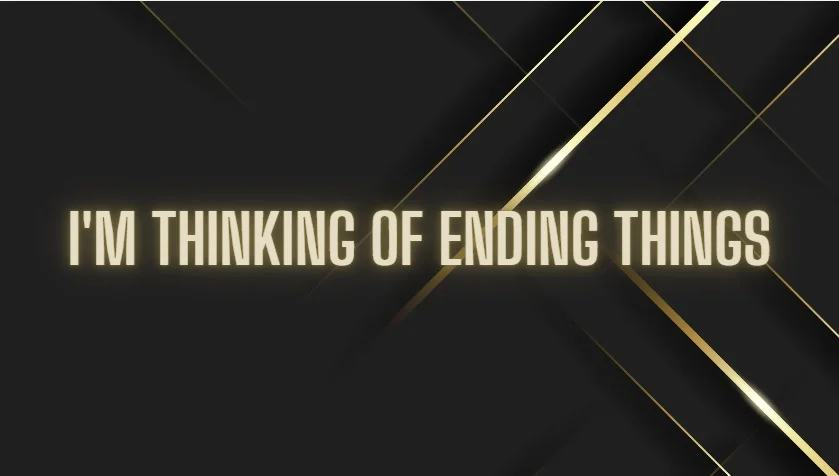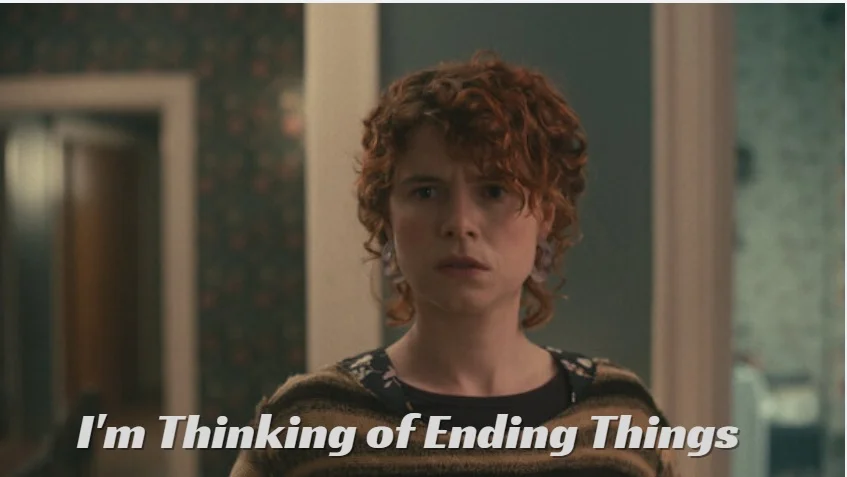“I’m Thinking of Ending Things” (stylized as “i’m thinking of ending things”) is a 2020 American surrealist psychological thriller film directed by Charlie Kaufman, based on Iain Reid’s 2016 novel of the same name. The film blends psychological unease, surrealism, and intricate symbolism to create an experience that leaves viewers both mesmerized and perplexed. Through its unique storytelling, “I’m Thinking of Ending Things” explores complex themes like existentialism, identity, relationships, and the nature of memory.
The plot centers around a young woman, played by Jessie Buckley, who embarks on a road trip with her boyfriend, Jake (Jesse Plemons), to meet his parents (Toni Collette and David Thewlis) at their remote farmhouse. As the story unfolds, seemingly mundane moments become increasingly disturbing, and reality begins to bend and fragment. Interspersed with the main narrative is a parallel story about a school janitor (Guy Boyd), whose life intersects with that of the couple in the film’s unsettling third act.
With its non-linear structure and thought-provoking dialogue, “I’m Thinking of Ending Things” challenges viewers to question what is real and what is imagined. This article will take an in-depth look at the film’s themes, its connections to the book, and its ultimate impact on audiences.
A Close Examination of the Plot
At the outset of the film, the young woman contemplates ending her relationship with Jake. As they drive to meet his parents in the desolate countryside, the woman’s inner thoughts—expressed through narration—begin to reveal her dissatisfaction and doubts about their future together. Despite her reservations, she continues with the trip, possibly out of politeness or societal expectations.
Once they arrive at Jake’s family home, things start to become increasingly strange. The behavior of Jake’s parents is erratic, with sudden mood changes and conversations that veer into uncomfortable territory. The timeline itself becomes unstable as the ages of the parents fluctuate rapidly, and memories seem to shift without explanation. This deliberate distortion of time and identity underscores the film’s central questions: How much of our reality is shaped by memory, and how reliable is that memory?
The Role of the Janitor
A key aspect of “I’m Thinking of Ending Things” is the recurring footage of a school janitor going about his day-to-day duties. At first, this character seems unrelated to the story of Jake and the young woman, but as the film progresses, it becomes clear that he holds a pivotal role in understanding the film’s deeper meaning.
In the film’s surreal third act, the janitor’s life and the lives of Jake and the young woman intersect in unexpected ways, suggesting that the janitor may, in fact, be an older version of Jake. The janitor is haunted by regrets, missed opportunities, and a life that could have been, mirroring the emotional turmoil that the younger Jake experiences. This narrative device reinforces the theme of identity and self-perception, illustrating how the passage of time warps our understanding of ourselves.
Themes and Symbolism in “I’m Thinking of Ending Things”
At its core, “I’m Thinking of Ending Things” is a meditation on existential dread, the fleeting nature of human connections, and the fluidity of time. Kaufman, known for his cerebral approach to storytelling, infuses the film with layers of symbolism that invite multiple interpretations.
One prominent theme in the film is the concept of aging and the inevitable decline of the human body and mind. The parents’ fluctuating ages and health conditions serve as a stark reminder of mortality. Additionally, the film often blurs the line between past, present, and future, leaving the audience to question whether events are unfolding in real-time or are merely memories—or even fantasies—being relived by the characters.
The young woman’s name, which changes several times throughout the film, further highlights the film’s exploration of identity. She is referred to as Lucy, Louisa, Yvonne, and Ames at different points, and her profession also shifts, adding to the sense of disorientation. This instability suggests that the young woman may be a projection of Jake’s idealized companion, rather than a fully realized individual.
Another recurring motif is that of the basement, which symbolizes the subconscious mind. At one point in the film, the young woman ventures into the basement and finds disturbing clues about Jake’s life. This sequence can be interpreted as a metaphor for confronting repressed memories and hidden truths that the characters, and perhaps even the audience, may not be ready to face.

“I’m Thinking of Ending Things” – The Book vs. the Movie
Adapting a novel as psychologically intricate as Iain Reid’s “I’m Thinking of Ending Things” was no easy task. The novel is known for its ambiguous narrative and unsettling atmosphere, and Kaufman’s film preserves much of that ambiguity while adding his own stylistic flourishes.
Book vs. Movie Differences:
While the book and the film share many similarities, there are some notable differences between the two. In the book, much of the story takes place inside the protagonist’s mind, with long stretches of internal monologue that reflect her thoughts about life, relationships, and self-worth. Kaufman translates this inner dialogue into voiceover narration in the film, but he also uses visual cues and surreal imagery to convey the protagonist’s psychological state.
One key difference between the book and the movie is the ending. In the novel, the final reveal—that the protagonist, Jake, and the janitor are the same person—leaves readers with a sense of haunting ambiguity. The film, on the other hand, leans more heavily into the surreal, with a climactic dance sequence and a reference to the musical “Oklahoma!” Kaufman’s version of the story is more dreamlike, leaving viewers to piece together the puzzle on their own.
The Ending Explained
The ending of “I’m Thinking of Ending Things” has been the subject of much debate and analysis. Many viewers were left scratching their heads, wondering what it all meant. In short, the film’s conclusion blurs the lines between reality and imagination, as Jake—now revealed to be the janitor—imagines a final confrontation between his younger self and the young woman.
As Jake watches this imagined scenario play out, it becomes clear that the young woman was never real. She is a figment of his imagination, a manifestation of his regrets and his desire for human connection. The janitor, consumed by loneliness and a lifetime of disappointment, envisions a different version of his life, one where he could have made different choices and been someone else entirely.
In the final moments of the film, Jake receives a Nobel Prize in a fantasy sequence, only to find himself alone in the empty high school auditorium. The janitor dies in his car, succumbing to the cold, symbolizing the ultimate end of his life and dreams.
I’m Thinking of Ending Things – Reception and Critical Response
Upon its release, “I’m Thinking of Ending Things” garnered widespread critical acclaim for its complex narrative structure, exceptional performances, and atmospheric cinematography. Critics praised Kaufman for staying true to his trademark style of blending surrealism with psychological depth, and both Jessie Buckley and Jesse Plemons were lauded for their nuanced performances.
However, the film also divided audiences. Some viewers appreciated its ambiguous storytelling and philosophical themes, while others found it confusing or inaccessible. The open-ended nature of the film’s plot, particularly its cryptic ending, has sparked numerous discussions and interpretations on platforms like Reddit, where fans have sought to explain the film’s meaning in greater detail.
Conclusion
“I’m Thinking of Ending Things” is a thought-provoking film that defies conventional narrative structures. It delves deep into the human psyche, exploring themes of memory, identity, and the passage of time. Kaufman’s adaptation of Iain Reid’s novel stays true to the unsettling tone of the source material while adding its own layer of surrealism. For viewers willing to engage with its ambiguity and symbolism, “I’m Thinking of Ending Things” offers a rewarding, if challenging, cinematic experience.
FAQs
Who is the caller in “I’m Thinking of Ending Things” book?
In both the book and the film, the caller is likely a projection of Jake’s inner thoughts. The mysterious phone calls are a representation of his internal conflict, with the caller being a manifestation of his subconscious, signaling his sense of regret and isolation.
What is the difference between “I’m Thinking of Ending Things” book and movie?
While the book delves deeper into the protagonist’s inner monologue, the film takes a more surreal approach, using visual cues and symbolic elements to convey the same themes. The ending of the film is more abstract, with the inclusion of a musical number and a dream-like final sequence.
What is the significance of the janitor in “I’m Thinking of Ending Things”?
The janitor represents Jake’s older self. He is a reflection of Jake’s life as it might have unfolded had he remained isolated and full of regrets. The janitor’s scenes symbolize the passage of time and the way Jake’s memories have warped over the years.
What is the meaning of the title “I’m Thinking of Ending Things”?
The title refers to multiple interpretations. On the surface, it suggests that the protagonist is thinking of ending her relationship with Jake. However, as the film progresses, it becomes clear that it may also refer to Jake’s desire to end his life or his struggle to reconcile with his past.
What does the basement symbolize in the film?
The basement in Jake’s family home symbolizes the subconscious mind and the hidden, darker aspects of one’s identity. When the young woman ventures into the basement, she uncovers clues about Jake’s troubled psyche, suggesting that the basement is a metaphor for repressed memories.
How does “I’m Thinking of Ending Things” end?
The film ends with Jake, now revealed to be the janitor, imagining a final confrontation with the young woman and receiving a Nobel Prize in a dream-like fantasy. Ultimately, the janitor dies in his car, symbolizing the end of his life and the culmination of his regrets.









